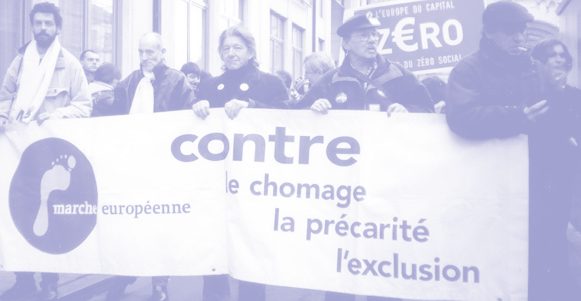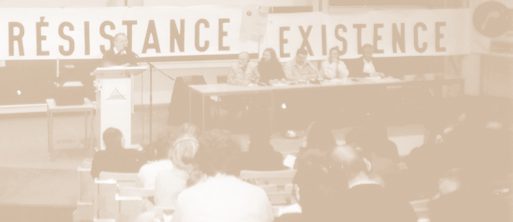

 |
 |
 |
 |
 | ||
European Marches
|
||||||||||||||
| ||||||||||||||
3. Resources guarantees in the different European countries |
||||||||||||||
|
Jean-Guy Dufour (source: synthesis :« The break of the unemployment social protection system in the E.U », work done by Marie-Paule Connan from data of the MISSOC (Mutual Information System on Social Protection) and from a study realized for the E.C. by the Gesellschaft für Versicherungswissenschaft und Gestaltung in 2003). Germany. a federal law guarantees a minimum income (Sozialhilfe) which precise amount is set by the Länder. This income is granted without any condition of age and is unlimited as long as the person does not find any other resource. Accommodation and healthcare expenses are completely covered. The Socialhilfe is cut by 25% in case the person refuses a job considered as acceptable. This pressure will be much stronger with the new measures of the 2010 Agenda. To give a rough idea of the Socialhilfe monthly income: single person: 322 €; couple without child: 660 €; couple with two children: 1074 €. Austria.The guaranteed income (Sozialfilfe) is defined by regional laws and is quite different from one Land to another (from 382 € to 496 €). The conditions of allocation are the same as in Germany. single person: 382 to 496 €; couple without child: 549 to 719 €; couple with two children: 979 to 1237 €. Belgium.The Minimex is allocated to persons without any mean of support older than 18 years old, it is uniform in the whole country. single person: 572 €; couple without child: 763 €; each extra dependent person 381 € Denmark. The Socialbistand is defined by a national law. It is allocated to people older the 18 years old without any mean of support. It can be cut by 30% if it is considered that the person has refused a job without any valid reason. Health care expenses are covered and housing benefits might be added. single person: 686 € for the ones under 25 and 1025 for others; couple without child: 2129 €; couple with two children: 3028 €. Spain. the renta minima is defined by regional laws and is allocated to very few people. The people are entitled for a 12 month period that can be renewed. The beneficiaries are the persons only older than 25 years old unless they have children. The amount goes from 180 to 228 €. Finland. The Toimeentulotuki is defined by a national law. It is allocated to people older than 18 years old as long as the person cannot improve his situation. Specific housing benefits might be added. The amount differs according two categories of region. single person: 370 € or 354 € according to the region; couple without child: 630 € or 600 €; couple with two children: 890 € or 850 €. France. the minimum income scheme (RMI) is defined by national law and by departments (French territorial division). It must go with inclusion measures more and more conceived as « activation » measures. It ensures incomes which levels are limited as shown below. People entitled must be older than 25 years old unless they have children, and those who have legally been residing in France for at least three years. Health care is free of charge and housing benefit can be added. single person: 418 €; couple without child: 627 €; couple with two children: 877 €. Greece. no guarantee of resources Ireland . Le Supplementary Welfare Allowance is defined by a national law. People older than 18 years old without any mean of support are entitled for an unlimited duration. There are also employment schemes encouraging unemployed to get a job or studies. Supplementary allowances for housing can be allocated. single person: 515 €; couple without child: 856 €; couple with two children: 1237 € Italy. the minim single o vitale is defined by regional laws. The amount is set at local level according to individual situations. Health care is free of charges for the beneficiaries. Housing benefits can be allocated in some regions. single person: from 232 € to 372 € Luxembourg.The guaranteed minimum income is defined by a national law. People older than 25 years old are entitled for an unlimited duration. In addition, some housing benefits can be allocated. As for health care, the health care insurance is obligatory. single person: 919 €; couple without child: 1378 €; couple with two children: 2004 € Netherlands. The Algemene Bijstand is defined by a national law in relation with the net minimum wage (100% for a couple, 50% for an isolated person). Local authorities can allocate some supplementary aids up to 209 €. People older than 18 years old are entitled for an unlimited duration though people under 23 have a reduced rate. The allowance can be cut or suspended in case of refusal to work.Isolated person: 523 €; couple with or without children: 1041 € Portugal. The Rendimento Minimo Garantido the rendimento Minimo Garantido is defined by a national law. It is set at national level and allocated to people older than 18 (or younger if they have children), for an unlimited duration as long as resources are insufficient. Health care is guaranteed. The payment is accompanied with social inclusion measures. Isolated person: 138 €; couple without child: 277 €; couple with two children: 415 €. United Kingdom. The Income Support is defined general rules and is allocated for an unlimited duration to any person older than 18 years old, declared unfit to work and not reaching a minimum of resources. Incentive measures for employment have been set up, there are also aids for health and housing. (Including health care and housing benefits) single person older than 25: 728 €; couple without child: 1004 €; couple with two children: 2540 € Sweden. The Socialbidrag is defined by a national law. It is allocated for an unlimited duration without any condition of age. Health care and housing expenses are covered when necessary. It is compulsory to seek a job. single person: 338 €; couple without child: 569 €; couple with two children: 987 € Summary of the main points The following table summarizes the previous
information. A rough indication on guaranteed minimum
incomes in the countries which joined the E.U. on the 1st of May
2004 has been included. The last column takes up the
Euromarches demand of a guaranteed minimum income of 50%
of GDP per head.
|
Annexes |
|||||||||||||
|
<< L’évolution du chômage en Europe depuis 1997 Unemployment benefits in the different European countries >> 8. For a democratic Europe, of citizenship, social rights, equality and peace>> 
02/08/04
|
||||||||||||||